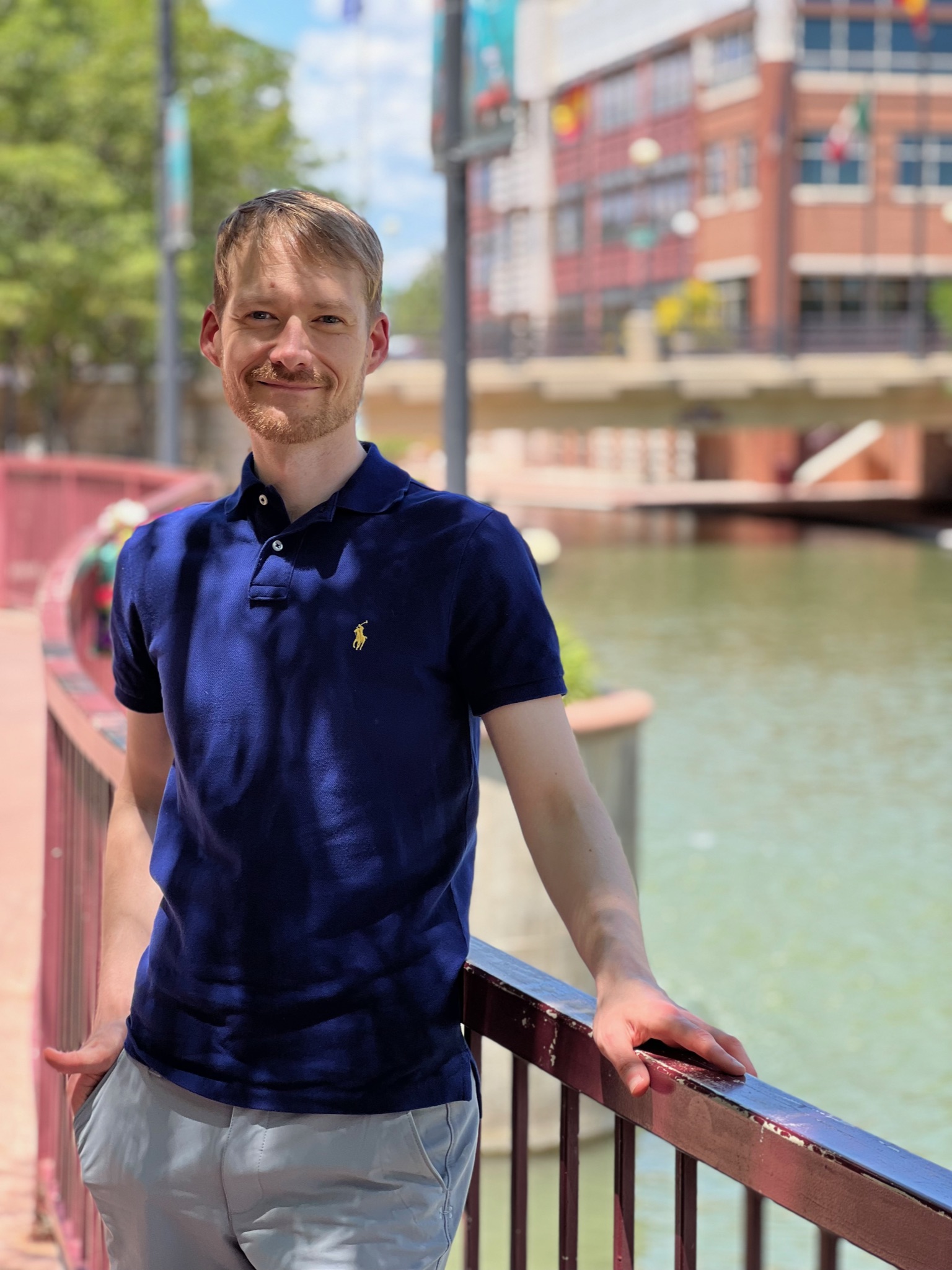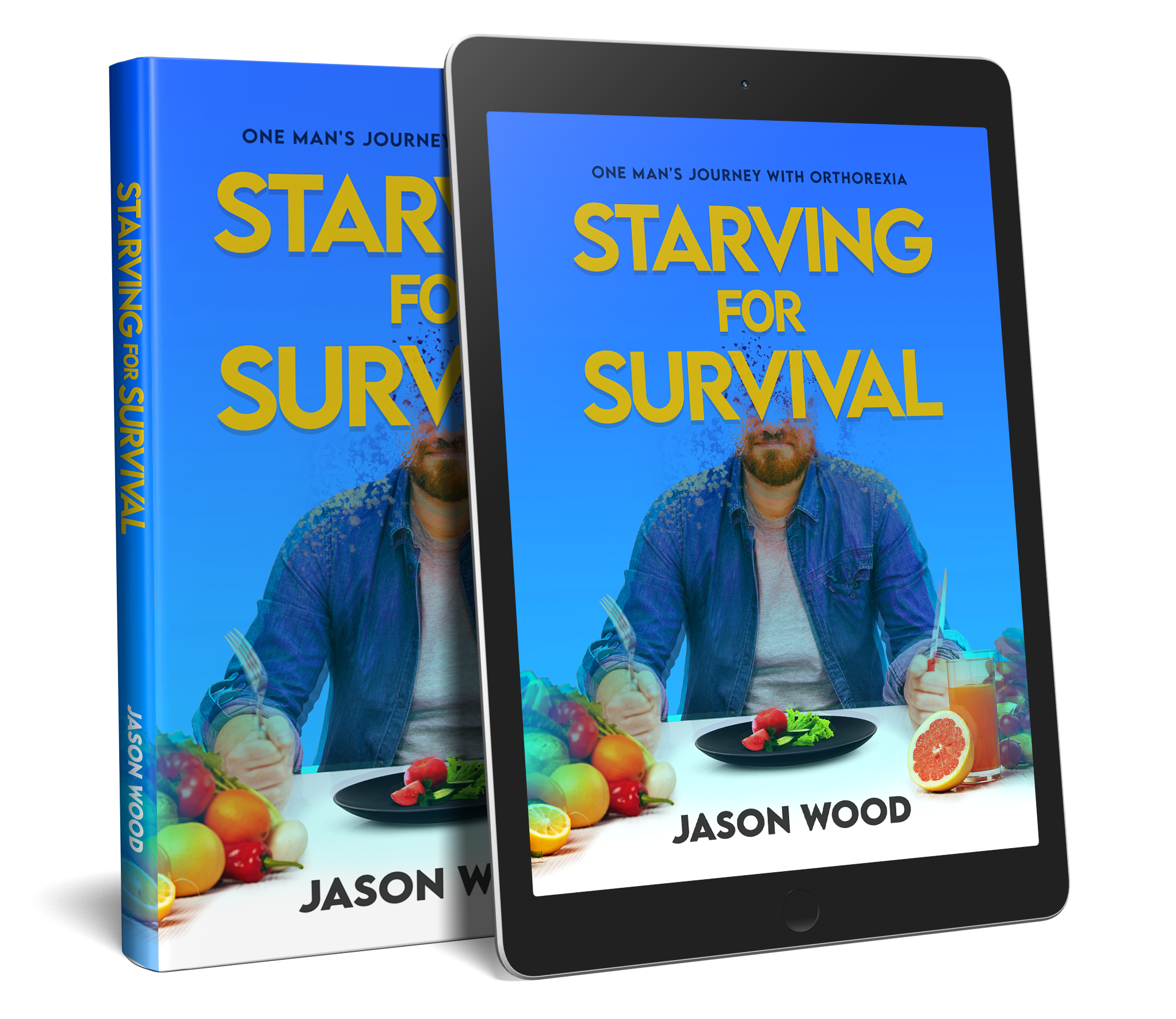

I’m Jason and I’m in recovery from orthorexia. I’ll stop there.
That’s usually about as far as I get into a conversation with someone before they ask what orthorexia is. Either that or they’re shocked that a guy can develop an eating disorder. I can’t blame them. I felt the same confusion when I came to terms with my diagnosis of an eating disorder, anxiety, and obsessive-compulsive disorder.
Orthorexia is essentially an obsession or fixation with healthy eating. In my case, I was taking food rules from various fad diets and molding them into what I thought was the best diet to control my weight, give myself value, and prevent disease or early death.
You may be thinking, what’s wrong with that?
Simply put, this dedication to diet and exercise nearly cost me my life. As it was, it took a devastating toll on my mental, emotional, and physical well-being. Recovery has been about identifying how my seemingly innocent desire to take care of myself turned into an obsession that consumed my life. So let’s take a look at how it all began.
I battled childhood obesity before joining Weight Watchers during my junior year of high school. Prior to this, I was the subject of many harsh comments from my peers at school. Throw in the fact that my dad passed away when I was 11, I soon struggled with both my body image and my masculinity.
Losing the weight, transformed my childhood shame and embarrassment into pride and accomplishment. For years, I allowed this event to define who I was. I felt accomplished and valued, unaware the fuse had been lit.
At 19, my mom died and chaos ensued. My family fell apart and I shouldered the blame and guilt for years. But I never spoke up because I didn’t think that’s what men do. I kept my friends in the dark about the anxiety and pain I experienced every day.
I spent the majority of my early twenties facing eviction, losing my license, and struggling to survive emotionally and financially. All the while, I found solace in the growing set of rules around food. My weekday meals usually consisted of the same “safe” foods but the weekends were my time to binge. Pizza, cake, beer, it was all fair game come Friday night. Meanwhile, the embers were beginning to glow. The unidentified thief slowly lured my life away from me.
Fast forward to 29 and I was preparing for a colonoscopy. Several concerning symptoms and a receptive doctor led me to a startling discovery: several large, aggressive precancerous polyps. Suddenly, I realized I was walking in my father’s footsteps but not in the way I had planned. He died of colon cancer twenty years earlier. Now, I found myself high risk for the same fate.
I couldn’t die young, I had so much to live for. I believe it was at this point that I started dying to live, literally. The flames erupted as foods were becoming “good” and “bad” but not just for weight loss. Now, my health hung in the balance.
In 2018, my now-husband popped the question. I was starting to feel that intimate love and immediate family sensation again but the food rules continued intensifying. With a wedding on the horizon and a slowing metabolism my previous game-changing diet of strict weekdays and weekend binges no longer proved effective. My weight crept up and the negative, self-critical thoughts returned with a vengeance. It was like having Simon Cowell and Gordon Ramsey in my head day and night. Here I was again on the brink of having everything but preparing to lose it all. I often turned to alcohol to douse the rising flames but to no avail, I still felt like an imperfect failure by my unrealistic high standards.
The list of bad foods grew exponentially. Wheat bread, peanut butter, and brown rice, once safe, quickly became no-nos. During this phase, I started looking down on others for their diets. How dare they invite me to their fatty, carb-loaded feast at the work potluck! The flames raged. I passed up invitations to join others for fear of coming face to face with bad foods. One time, I left a friend’s birthday party early because the vegetables were sprinkled with parmesan cheese and I couldn’t have that. I couldn’t find an alternative option to eat on the way home so I just went to bed hungry. It was the only way to ensure a quiet night from the judges inside my head.
The thought of an eating disorder never crossed my mind. I justified my efforts to control what I ate by reminding myself and others that since I still ate food and didn’t purge. I saw no wrong in striving for a healthy diet. Plus, men don’t get eating disorders, right?!
Speaking of men, I longed to be like the influencers I saw on social media. The strong guys, with bulging biceps and stiff upper lips. The one who seemed happy and healthy. I feared that letting people in on the pain and guilt I felt from the turbulent period after my mom’s death would make me appear weak. It was already bad enough that I was gay, so I suppressed my emotions down deep in an effort to appear more masculine.
With this unresolved pain and turmoil haunting me, I allowed food, health, and weight to control my every waking moment. I needed to plan meals far in advance to avoid guilt, remorse, and that dreaded heavy feeling. This caused stress in my relationships, even with my husband. We couldn’t be spontaneous with food or weekend plans because I needed to know when and where we would eat days in advance. Then I could analyze the menu and make the healthiest choice possible, while still compensating with smaller meals or longer workouts as needed. It must have been a blast to take a trip with me! Even on my own wedding day, I felt guilty after eating a mini cupcake that I had prepared weeks and months in advance to eat.
The pandemic poured gasoline on the situation. An unprecedented time combined with my personality traits and emotional baggage led to a level of control never seen before. We were at full-blown wildfire stage now. I could no longer treat myself to items I once loved like pizza, doughnuts, and ice cream. Not even a small bite or I felt guilt and failure for days.
On July 4th, the fire alarms finally sounded. Ironically, Independence Day was the day I started down the road to my own independence from obsessive thoughts about food and diet. We took a short weekend trip out of town. After endless debates about where to eat, a familiar occurrence, my husband and I found a “safe” restaurant in Cheyenne that looked to meet my stamp of approval. However, I refused to eat anything after learning I couldn’t substitute the pita on the hummus plate for raw vegetables. How dare they expect me to eat something with flour in it! My husband expressed his concerns and in this moment of weakness, something awoke within me. He opened my eyes to the pain and hurt in my childhood, and teen years and the damage I was doing to myself now.
The following Monday, I called my doctor and started my road to recovery. I worked through personal issues with my therapist, who helped me better understand my anxiety and OCD thoughts, thus enabling me to address my disordered eating. Note the wording here about disordered eating. I remained blind to the fact I had an actual eating disorder that could kill me. I did not fit the bill for anorexia or bulimia, so all I had to do was fix this unhealthy relationship with food. I didn’t have that serious of a problem or so I thought.
Next, I started working with an RDN who developed a nutrition program to help build back muscle and fat. She advised me that I was at high risk for a sudden cardiac event. My body constantly hurt, I was always cold, so cold, and lacked energy. Yet, it was still so hard to eat those “bad” foods. I was standing amid the scorched earth of my eating disorder and still refusing to accept the water. Thanks to my therapy sessions, my resilient nature eventually returned. I realized I needed to at least trust my support team and the process. I might not agree with it or feel comfortable but I needed to blindly trust.
It wasn’t until I started reading books on eating disorders, that I identified the mysterious force I've been fighting for half my life. One morning I stumbled across the term orthorexia. Having no idea what it was, I did the natural thing and googled the term. That’s it! That’s what I am battling! With its true identity revealed, I could now extinguish the flames that engulfed my life.
As a male with a lesser-known eating disorder and mental illness, I recognized the need to share my story. At the height of my battle, I didn’t have anyone I could relate to. Even when I reached out for help, I felt like I was not worthy of it because I did not match the stereotypes. That is why I launched my blog, Orthorexia Bites, and published Starving for Survival. I want to raise awareness of the condition that nearly cost me my life and confront the stigma and stereotypes around mental health in men. Recovery is a long process but I am learning to trust it, embrace it, and even enjoy it from time to time. I now understand that the strongest man in the room is the one who is open and honest with how he feels. By embracing my own vulnerability, I am reclaiming my life one day and one bite at a time!
- Jason Wood

